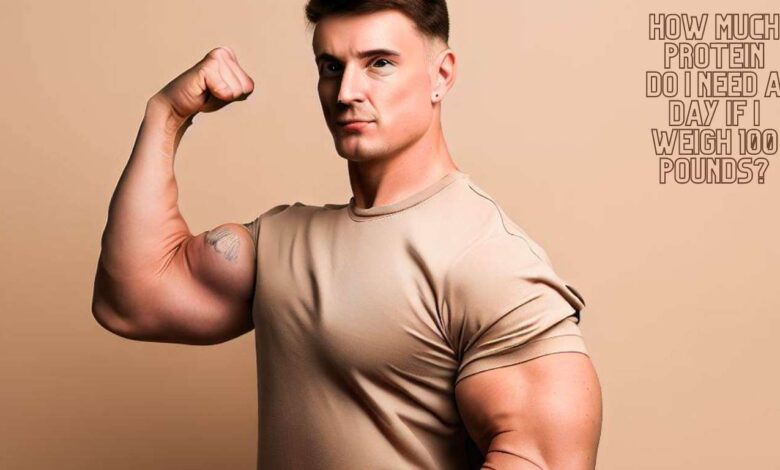How Much Protein Do I Need a Day if I Weigh 100 Pounds?

Protein is a really important nutrient for our bodies and does a lot of important things. If you’re an athlete, want to build muscle, or just want to stay healthy, it’s important to know how much protein you need every day. In this article, we’ll discuss the best amount of protein for people weighing 100 pounds. We’ll provide helpful information to guide your dietary decisions.
Protein is needed for tissues, enzymes, hormones, the immune system, and overall health. Protein needs can differ depending on age, activity level, and overall health. But there are general rules to figure out how much protein a 100-pound person should have.
Understanding Protein and Its Importance
Protein is composed of amino acids, which are the building blocks of life. It is essential for the growth, repair, and maintenance of tissues in the body. Proteins are involved in numerous vital functions, including:
- Building and repairing muscles, bones, and organs.
- Supporting immune system function.
- Regulating hormones and enzymes.
- Transporting nutrients and oxygen in the blood.
- Assisting in the production of antibodies for a robust immune system.
Protein is important for your health, especially if you weigh 100 pounds.
Daily Protein Requirements
The daily protein you need depends on your weight, activity level, and health goals. The DRI suggests that an average adult should consume 0.8 grams of protein per kilogram of body weight each day. However, protein needs may differ for individuals with specific requirements.
Factors Influencing Protein Needs
Several factors can influence an individual’s protein requirements, including:
- Individuals who weigh more may need additional protein to support their body mass.
- Regular exercise and sports require more protein to repair and build muscles.
- People need different amounts of protein based on their age. Older adults might need more protein to prevent muscle loss that happens with aging.
- Health Conditions: Certain health conditions, such as kidney disease, may necessitate protein restrictions. If you have health concerns, make sure to talk to a healthcare professional.
To find the right amount of protein for your needs, it’s important to understand these factors.
How to Calculate Protein Intake for 100 Pounds
If you weigh 100 pounds, you can use a simple formula to figure out how much protein you should have each day. To keep it simple, it’s generally suggested to eat around 0.8 to 1 gram of protein for every pound you weigh. Therefore, a 100-pound person would aim for a daily protein intake of between 80 and 100 grams.
Sources of Protein for a 100-Pound Individual
Various sources of protein can be incorporated into a 100-pound individual’s diet. These include:
- Lean Meats: Chicken breast, turkey, lean beef, and pork tenderloin.
- Fish and Seafood: Salmon, tuna, trout, shrimp, and scallops.
- Dairy Products: Greek yogurt, cottage cheese, and milk.
- Eggs: A complete protein source that is versatile and easy to prepare.
- Legumes: Beans, lentils, chickpeas, and soy products.
- Nuts and Seeds: Almonds, peanuts, chia seeds, and hemp seeds.
To ensure your body gets all the essential amino acids it needs, make sure you eat a variety of foods rich in protein.
High-Protein Foods to Include in Your Diet
To get more protein, it helps to eat foods with lots of protein every day. Here are some examples of high-protein foods:
- Grilled chicken breast: A 3-ounce serving contains approximately 26 grams of protein.
- Greek yogurt: A 6-ounce serving provides around 17 grams of protein.
- Tofu: A 3-ounce serving contains about 8 grams of protein.
- Lentils: A 1/2 cup serving provides around 9 grams of protein.
- Eggs: One large egg contains approximately 6 grams of protein.
- Cottage cheese: A 1/2 cup serving provides around 14 grams of protein.
Incorporating these foods into your meals will help meet your daily protein requirements.
Plant-Based Protein Options
For individuals following a vegetarian or vegan lifestyle, plant-based protein sources are essential. Here are some plant-based protein options:
- Quinoa: A 1-cup serving contains around 8 grams of protein.
- Chia seeds: Two tablespoons provide approximately 4 grams of protein.
- Hemp seeds: Three tablespoons contain about 10 grams of protein.
- Tempeh: A 3-ounce serving provides around 16 grams of protein.
- Chickpeas: A 1/2 cup serving contains about 7 grams of protein.
- Spirulina: Two tablespoons provide approximately 8 grams of protein.
- How Many Calories Do 5,000 Steps Burn?
Plant-based protein sources have many nutrients and can be part of a balanced diet.
Recommended Protein Intake for Different Lifestyles
The recommended protein intake can vary based on different lifestyles and health goals. Here are some guidelines for specific populations:
- Athletes and active people may need to eat more protein to help their muscles recover and grow. Aim for 1.2 to 2 grams of protein per kilogram of body weight.
- Older adults may need to consume more protein to maintain their muscle mass as they age. Aim for 1 to 1.2 grams of protein per kilogram of body weight.
- Pregnant and breastfeeding women need protein for the baby’s growth and milk production. Pregnant and breastfeeding women should aim for 1.1 to 1.3 grams of protein for every kilogram of body weight.
These recommendations can vary based on your needs, so make sure to adapt them to your situation. Consulting with a registered dietitian or healthcare professional can provide personalized guidance.
Protein and Weight Management
Protein can play a significant role in weight management. It has been found that this can make you feel full, reduce your hunger, and maintain your muscle mass while you lose weight. Eating foods with protein can help you feel full for longer and prevent overeating.
If you want to lose weight, you need to eat fewer calories than you burn, but make sure you still get enough protein. Regular exercise, a balanced diet, and enough protein help you lose weight and keep it off.
Protein for Muscle Building and Recovery
Protein is often associated with muscle building and recovery. When you do strength training or other exercise that damages your muscles, protein is important for fixing and building muscle fibers.
If you want to build muscle or improve as an athlete, it’s suggested to consume a bit more protein. Eating protein before and after working out can help build muscles and aid in recovery.
Protein and Exercise Performance
Protein also plays a role in exercise performance. During long or intense exercise, the body uses amino acids from proteins for energy. Protein is important for muscles during exercise to stay strong and not break down.
To perform well, it’s best to eat a balanced meal with protein, carbs, and fats a few hours before you exercise. Additionally, consuming protein-rich snacks or shakes post-workout can aid in muscle recovery.
Protein Timing and Distribution
Getting enough protein every day is important, but when and how you have it can also affect how well it works. Eating a moderate amount of protein (20-30 grams) per meal can help build muscle.
Spread out your protein intake evenly throughout the day. This helps provide a constant flow of amino acids for muscle repair and growth. Aim to include a source of protein in each meal and snack for maximum benefit.
Protein and Aging
As people get older, their muscles naturally become smaller and weaker. This is called sarcopenia. To prevent muscle loss and stay healthy, it’s important to get enough protein.
Older adults should focus on eating foods that are high in protein. They need to spread out their protein intake evenly throughout the day. Resistance training exercises can also help build muscles and protect them from loss.
Protein Deficiency Risks
Protein deficiency is uncommon in developed nations because people generally eat enough protein. Certain groups may have a greater chance of not getting enough protein.
- Individuals following severely restrictive diets or fad diets.
- Vegetarians and vegans need to plan their meals properly to ensure they get enough protein.
- Individuals with certain medical conditions that affect protein metabolism or digestion.
Protein deficiency can cause muscle wasting, fatigue, weakness, slow wound healing, and a weaker immune system. If you think you don’t have enough protein, it’s important to see a doctor for diagnosis and treatment.
Protein Myths and Facts
There are several myths and misconceptions surrounding protein consumption. Let’s debunk some of the common ones:
- Myth: High protein intake is harmful to the kidneys. Fact: If you have kidney disease, it’s important to watch how much protein you eat. However, a high-protein diet is usually safe for healthy people.
- Myth: You must consume protein immediately after a workout for muscle gain. Fact: Having enough protein throughout the day is more important for your body than when you consume it after a workout.
- Myth: Plant-based proteins are incomplete and inferior to animal-based proteins. Fact: Plant-based proteins can provide all the essential amino acids when combined properly. A varied plant-based diet can meet protein needs.
- Myth: Excessive protein consumption leads to weight gain. Fact: Excess calories from any macronutrient can contribute to weight gain. Protein itself is not inherently fattening.
It’s important to separate what is true and what is not and use scientific evidence to make informed decisions.
Balancing Protein with Other Nutrients
Protein is important. It’s crucial to have a balanced diet with all essential nutrients. Carbohydrates and fats are also necessary for overall health and energy production.
To stay healthy, eat a mix of whole grains, fruits, vegetables, good fats, and lean proteins. This ensures you get all the nutrients you need. Balance and moderation are key to a well-rounded and nutritious diet.
Tips for Increasing Protein Intake
If you find it challenging to meet your protein needs, here are some tips to increase your protein intake:
- Incorporate protein-rich foods into every meal and snack.
- Experiment with new recipes that feature protein sources.
- Opt for lean cuts of meat and remove visible fat.
- Choose plant-based protein options like legumes, tofu, and tempeh.
- Include dairy products, such as Greek yogurt and cottage cheese, in your diet.
- Snack on protein-rich foods like nuts, seeds, or protein bars.
- Consider protein supplements like whey protein powder or plant-based protein powders if necessary.
Make sure to talk to a dietitian or healthcare expert to get advice that suits your dietary needs.
Potential Side Effects of Excessive Protein Consumption
Eating too much protein can have side effects even though it’s important for your health. Some risks associated with high protein intake include:
- If you already have kidney problems, your kidneys may be under more strain. It’s crucial to monitor protein intake if you have kidney-related concerns.
- Protein sources alone can cause imbalances in important nutrients. A balanced diet is crucial to ensure all nutritional needs are met.
- If you eat too much protein, it can cause problems with digestion like feeling bloated, gassy, and constipated. Drinking plenty of water and including fiber-rich foods can help mitigate these issues.
To stay healthy, make sure you consume protein in the right amounts. This helps avoid any possible negative effects.
Protein and Health Conditions
Protein intake can have specific considerations for individuals with certain health conditions. Here are a few examples:
- Protein doesn’t cause a big increase in blood sugar levels, so it’s a good option for people with diabetes. It’s important to think about both the carbs and fats in your meals to control your blood sugar well.
- Heart Health is crucial for keeping your heart healthy. To maintain heart health, it is important to choose lean sources of protein and reduce the intake of saturated and trans fats. Choose fish, skinless poultry, legumes, and low-fat dairy to promote a healthy heart.
- If you have kidney disease, you might have to limit how much protein you eat. This helps ease the strain on your kidneys. Consulting with a healthcare professional or registered dietitian is crucial for personalized guidance.
It’s worth noting that dietary advice may change depending on your health conditions. Working with healthcare professionals will help ensure a suitable diet plan.
Conclusion:
To live a healthy life, it’s important to know how much protein you need, particularly if you weigh 100 pounds. To optimize your protein intake, you can calculate how much protein you need each day, eat foods that are rich in protein, and take into account your own needs and goals.
Make sure to have a balanced diet that includes all important nutrients. Consider the right proportion of protein, carbohydrates, and fats. Also, pay attention to when you’re hungry and when you’re full. If you have any health concerns or questions about your protein needs, it’s best to talk to a registered dietitian or healthcare professional. They can provide personalized guidance and answer your specific questions.
FAQs:
How Many Meals Should I Eat in a Day?
You should eat the number of meals that suit your preferences and lifestyle. There is no one-size-fits-all answer to this question. Some people like to eat three balanced meals a day. Others prefer having smaller meals and snacks more often.
It’s important to listen to your body’s hunger and fullness cues and eat when you’re hungry. If you prefer eating smaller meals more often, you can try having 4-6 smaller meals or snacks spread out across the day. The key is to focus on the overall balance and nutritional quality of your meals and snacks.
Is It Possible to Consume Too Much Protein?
Yes, it is possible to consume too much protein. Protein is important for your health. However, consuming too much protein can strain your kidneys and cause imbalances in nutrients. The DRI suggests consuming 10-35% of your daily calories as protein.
Make sure you eat enough protein following the guidelines for your needs. If you have health issues, it’s best to talk to a doctor or dietitian for personalized advice.
Can I Get Enough Protein from a Vegetarian Diet?
Yes, it is possible to get enough protein from a vegetarian diet. Plant-based proteins like legumes, tofu, tempeh, quinoa, nuts, and seeds are high in protein. By including a variety of these protein sources in your meals, you can meet your protein needs.
Make sure to eat different plant proteins to get all the essential amino acids your body needs. To create complete protein profiles, you can combine legumes and whole grains.
Are Protein Supplements Necessary?
Protein supplements are not necessary for everyone. You can get enough protein from a balanced diet that includes foods high in protein. However, there may be certain situations where protein supplements can be beneficial.
People who do a lot of exercise or sports might take protein supplements to help their muscles recover and grow. If you’re a vegetarian or a vegan and find it hard to get enough protein from food, you can think about using protein supplements too.
Supplements don’t replace whole foods as the main source of nutrition. To know if you need protein supplements, talk to a healthcare pro or dietitian. They’ll help you figure it out.
Can Protein Help with Weight Loss?
Protein can play a beneficial role in weight loss. It can help you feel full, decrease your hunger, and maintain your muscles when you eat fewer calories. Including foods high in protein in your meals can help you feel full for longer. This can reduce the chance of eating too much.
Protein has a higher thermic effect than carbohydrates and fats. This means it takes more energy to digest and metabolize. This can slightly increase the number of calories burned during digestion.
It’s important to remember that losing weight involves multiple factors. These include how many calories you eat, how active you are, and eating a balanced diet. Just having protein is not enough to lose weight. You also need to focus on other healthy lifestyle choices.




